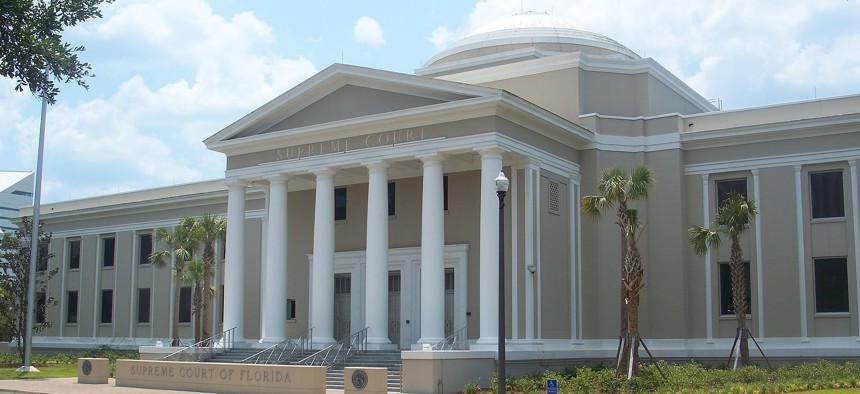Opinion
Opinion: A reminder on judicial independence after Justice Polston’s resignation
The judiciary should be free from the influences of special interests and from overreach by the other two branches of government, attorney Melanie Kalmanson writes.

Ebyabe, CC BY-SA 3.0 <https://creativecommons.org/licenses/by-sa/3.0>, via Wikimedia Commons
Florida Supreme Court Justice Ricky Polston recently submitted his resignation to Gov. DeSantis, effective March 31. His resignation comes as a bit of a surprise since he had several years of eligibility left to serve on the Court. Article V, section 8, of the Florida Constitution allows justices to serve on the Court until they turn 75. Justice Polston also just passed a retention election with 63% of the vote.
After appointing Polston’s successor, Gov. DeSantis will have appointed five of the seven current justices on the Court. As discussion ensues about what will happen next, it's critical to remember and preserve judicial independence – a responsibility we all share. This entails discussing the courts without politically charged labels, evaluating courts and judges based on appropriate factors, and the courts themselves staying above political influence.
High court turnover
To be sure, the U.S. Supreme Court and Florida Supreme Court have changed in recent years. In fact, the Florida Supreme Court has seen a lot of turnover for various reasons. In 2019, three justices – Barbara J. Pariente, R. Fred Lewis, and Peggy A. Quince – retired due to the requirement in the Florida Constitution that justices retire upon turning 70. (That age was increased to 75 shortly after.) As a result, the Court welcomed three new justices: Carlos Muñiz, Barbara Lagoa, and Robert Luck.
Shortly after being appointed, President Donald Trump appointed Lagoa and Luck to the U.S. Court of Appeals for the 11th Circuit. Their vacancies again brought two new justices to the Court: John D. Couriel and Jamie R. Grosshans, both of whom remain on the Court. Then, in early 2022, Justice C. Alan Lawson announced his resignation from the Court. He was replaced by Justice Renatha Francis, the Court’s newest justice.
Even with the recent changes in the Court, judicial independence remains of critical importance.
Preserving the judiciary's independence
Here's why: Judicial independence is the cornerstone of our constitutional system of checks and balances. Under this system, the judicial branch should be fair and impartial, free from the influences of special interests and, in particular, overreaching by the other two branches of government. In Federalist Paper No. 78, Alexander Hamilton wrote: “The complete independence of the courts of justice is peculiarly essential in a limited Constitution.”
Today’s polarized politics pose a threat to a free and impartial judiciary. While discourse about the activity of our courts is important, these discussions should be free from politically charged labels, which undermine the legitimacy of our courts.
In discussing the courts and their opinions, justices should not be identified by who appointed them or by their perceived party affiliations. For example, Justice Polston’s successor should not be identified as “another DeSantis justice” and should not be expected to decide cases in lock step with the governor’s agenda or the Republican Party’s ideology. Instead, in discussing the courts and their decisions, we should focus on the court’s reasoning and whether the decision is supported by the law and the facts.
Likewise, the way we evaluate judges matters. Rather than assessing a judge based on the politician who appointed the judge to the bench or the judge’s perceived political affiliations, we should evaluate judges based on objective standards. The Informed Voters Project (IVP) of the National Association of Women Judges directs that judges "should be appointed or elected based on their integrity, professional competence, judicial temperament, professional excellence and commitment to public service and the administration of justice.”
Judges also play a role in preserving and maintaining judicial independence. As the IVP explains, they "take an oath to administer justice without fear or favoritism, and to be free of outside influences.” Consistent with this oath, judges should be above politics in carrying out their duties. Cases should be decided based on the facts and the law, not popular will or perceived political party ideology.
Threats to judicial independence threaten our entire system of democracy and undermine the courts’ abilities to carry out their duties and provide “justice for all.”
Melanie Kalmanson, a graduate of the Florida State University College of Law, has been a member of The Florida Bar since 2016. Views expressed are those of the author and not of the City & State Florida editorial staff.
NEXT STORY: Bill Cotterell: Ethics panel is easy to use politically
